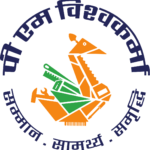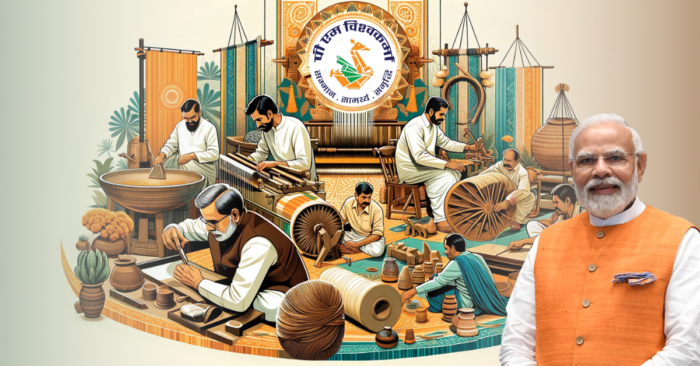
PM
Vishwakarma
Scheme
Indian economy consists of artisans and craftspeople who work with their hands and tools, are usually self-employed and are generally considered to be a part of the informal or unorganised sector of the economy. These traditional artisans and craftspeople are referred to as ‘Vishwakarmas’ and are engaged in occupations like Blacksmiths, Goldsmiths, Potters, Carpenters, Sculptors, etc. These skills or occupations are passed from generation-to-generation following a guru-shishya model of traditional training, both within the families and other informal groups of artisans and craftspeople.
PM Vishwakarma is implemented as a Central Sector Scheme, fully funded by the Government of India, with an initial outlay of Rs 13,000 crore. The Scheme is conjointly implemented by the Ministry of Micro, Small and Medium Enterprises (MoMSME), the Ministry of Skill Development and Entrepreneurship (MSDE) and the Department of Financial Services (DFS), Ministry of Finance (MoF), Government of India.
The objectives of the Scheme are:
To enable the recognition of artisans and craftspeople as Vishwakarma, making them eligible to avail all the benefits under the Scheme.
- To provide skill upgradation to hone their skills and make relevant and suitable training opportunities available to them.
- To provide support for better and modern tools to enhance their capability, productivity, and quality of products and services.
- To provide the beneficiaries an easy access to collateral free credit and reduce the cost of credit by providing interest subvention.
- To provide incentives for digital transactions to encourage digital empowerment of Vishwakarmas.
- To provide a platform for brand promotion and market linkages to help them access new opportunities for growth
PM Vishwakarma is a holistic Scheme that envisages to provide end-to-end support to the artisans and craftspeople through the following components:
- Recognition: PM Vishwakarma Certificate and ID Card
- Skill Upgradation
- Toolkit Incentive
- Credit Support
- Incentive for Digital Transactions
- Marketing Support
List of PM Vishwakarma Yojana eligible trades
Carpenter (Suthar/ Badhai)
Boat Maker
Armourer
Blacksmith (Lohar)
Hammer and Tool Kit Maker
Locksmith
Sculptor (Murtikar, Stone Carver), Stone Breaker
Goldsmith (Sonar)
Potter (Kumhaar)
Cobbler (Charmakar) / Shoesmith / Footwear Artisan
Masons (Rajmistri)
Basket / Mat / Broom Maker / Coir Weaver
Doll & Toy Maker (Traditional)
Barber (Naai)
Garland Maker (Malakaar)
Washerman (Dhobi)
Tailor (Darzi)
Fishing Net Maker
Eligibility :
- You must be at least 18 years old on the date of registration.
- You must be an Indian citizen and resident of India.
- Only one family member can apply for the Scheme and be eligible for benefits under it. A “family” for purposes of receiving benefits under the Scheme is defined as the husband, wife, and unmarried children.
- A person who is employed in any government service (Central/State) and the family members of that person cannot avail of the benefits of the scheme.
- The beneficiary must be working in the eligible trades at the time of registration and must not have benefited from loans under PMEGP, PM SVANidhi, MUDRA, or other credit-based programmes for self-employment or business development offered by the Central Government or State Governments within the last five years.
- The recipients of MUDRA and SVANidhi, on the other hand, who have fully returned their loans, will be qualified under PM Vishwakarma. This five-year period will start counting from the day the loan was approved.
Highlights of Scheme :
The Basic Training is of 40 Hours ( Over 5 to 7 Days )
Board & Lodging is free
Wage Compensation of 500/- per day
Optional Advanced Training of 15 Days / 120 Hours
Tool Kit Incentive upto 15000/-
How to apply
To apply for the PM Vishwakarma Yojana, you can visit the website of the Ministry of Micro, Small and Medium Enterprises (MSME) or contact the nearest Common Service Centre (CSC). You will need to provide the following documents:
- Aadhaar card
- Voter ID card
- PAN card
- Domicile certificate
- Bank account details
- Income certificate (optional)
- Caste certificate (optional)

